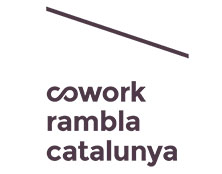Neus Inglada, gestora del espacio Cowork Rambla Catalunya, explicaba hace unos días en
un reportaje para TV3 que su espacio boutique, como a ella le gusta llamarlo, se desmarca
del modelo únicamente inmobiliario y propone un lugar de trabajo compartido en el
que se prioriza que los usuarios puedan interactuar, compartir conocimiento,
conectar y crear sinergias juntos.
Y es que el auge de los espacios de coworking es una respuesta directa a la evolución de las
necesidades laborales en nuestra era digital. A medida que más profesionales
buscan flexibilidad, comunidad y espacios de trabajo inspiradores, el coworking ha
emergido como una solución clave, desafiando a las grandes empresas de negocio
inmobiliario con su modelo único basado en la colaboración y la flexibilidad.
Una nueva era de espacios de trabajo.
El coworking se caracteriza por ofrecer espacios de trabajo compartidos que no solo
fomentan la sinergia entre diferentes profesionales y emprendedores sino que
también proporcionan la infraestructura y los servicios necesarios para que sus
negocios prosperen. Esta innovadora aproximación al espacio de trabajo contrasta
significativamente con las tradicionales ofertas inmobiliarias de grandes
corporaciones, las cuales suelen centrarse en arrendamientos a largo plazo de
espacios cerrados y personalizados.
Espacios de coworking: Colaboración frente a competencia
Una de las mayores ventajas de los espacios de coworking es su capacidad para fomentar la
colaboración natural entre sus miembros. A diferencia de los entornos corporativos
tradicionales, donde la competencia interna puede inhibir el compartir ideas y
recursos, los espacios de coworking alientan a sus usuarios a colaborar, compartir
conocimientos y habilidades, y trabajar conjuntamente en proyectos. Esta cultura de
colaboración no solo enriquece la experiencia de trabajo individual sino que también
puede dar lugar a innovaciones y empresas emergentes.
Flexibilidad y escalabilidad
Para freelancers, startups y empresas en crecimiento, la flexibilidad es clave. Los
espacios de coworking ofrecen una variedad de opciones que se adaptan a distintas
necesidades, desde escritorios individuales hasta oficinas privadas, con contratos
que varían desde días hasta meses. Esta flexibilidad es especialmente atractiva en
comparación con los compromisos a largo plazo y la rigidez que suelen caracterizar
a los contratos de arrendamiento tradicionales de las grandes firmas inmobiliarias.
Un desafío para el negocio inmobiliario tradicional.
El modelo de coworking representa un desafío directo para el sector inmobiliario
tradicional. Su éxito ha forzado a muchas grandes empresas inmobiliarias a
reconsiderar sus ofertas y estrategias, incluyendo el desarrollo de sus propios
espacios de coworking o la formación de alianzas con redes de coworking
establecidas. Este cambio es un testimonio del creciente reconocimiento de la
necesidad de adaptarse a las nuevas demandas del mercado laboral.
Conclusión:
El coworking no es solo un espacio de trabajo; es una comunidad y una forma de
vida que refleja las necesidades y valores de la fuerza laboral moderna. Frente a las
grandes empresas de negocio inmobiliario, el coworking ofrece una alternativa más
humana, flexible y colaborativa, redefiniendo lo que significa “ir a la oficina”. A
medida que el mundo sigue avanzando hacia una economía más dinámica y digital,
el coworking se posiciona como un pilar fundamental de esta nueva era laboral.
El concepto coworking va más allá de un simple lugar de trabajo, promueve la
conexión, colaboración y sinergias entre diferentes espacios y sus coworkers.
Prueba de ello es la Associació Coworking de Catalunya, Cowocat, a la que
pertenece Cowork Rambla Catalunya y que pretende ser una herramienta
dinamizadora de la economía y del territorio.

